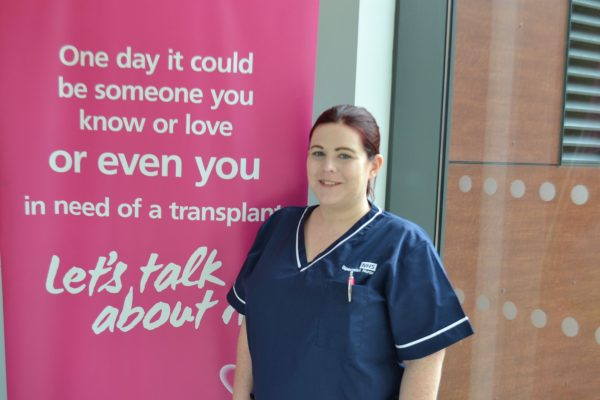Throughout Natalie Myatt’s nursing career she has always had a strong interest in organ donation.
“I did my nurse training at Wolverhampton University, qualifying in 2009, where I started working in Walsall before moving to the Queen Elizabeth Hospital in Birmingham,” she explained. “Through that time I worked in the Neurosurgical Intensive Therapy Unit and my planned pathway was always focused on organ donation.”
Natalie came back to Walsall Healthcare NHS Trust last October as a SNOD – Specialist Nurse – Organ Donation, a role which she also carries out for Royal Wolverhampton NHS Trust and The Dudley Group NHS Foundation Trust.
“I found it really rewarding looking after patients and their families and it’s that support for families that makes this role so worthwhile.
“Families can find it difficult to discuss organ donation when they have no clear idea of their loved ones wishes after their death. That’s why Organ Donation Week is such an important opportunity for us all to do what we can to encourage conversations around this topic.
“The death of a loved one is one of the worst times for a family, and many families take comfort in already knowing their loved ones wishes regarding organ donation, and they want to support their loved ones final decision.
“Having supported families through organ donation, a lot of families describe it as their loved ones doing something good for others after their own death. We know that those receiving organs describe it as completely life changing and life transforming for them and this is a remarkable gift.”
Donations aren’t as high in Walsall as they are in major trauma centres such as Birmingham, Stoke and Coventry but Natalie says staff in the Emergency Department and Intensive Care Unit work closely with her to ensure opportunities are not missed.
“That is one of the main elements of the SNOD role – a lot of teaching and training in the hospital, to provide all staff with all the appropriate information,” she said.
“For my work with families I would say the most important thing is to have the kind of personality that puts people at ease. Families have a lot of worries and questions. They particularly want reassurance that their loved one will be treated respectfully during the retrieval process and I can absolutely give them that reassurance. In theatre music can be playing, or special items can be brought in that mean something to the donor. I have known of pet dogs coming in to say goodbye to their owners.
“I support families throughout the whole process and I think they find some comfort from the fact they are able to talk to me about what kind of person the donor was; sharing some stories and fond memories of them.”
In her spare time Natalie, aged 31, likes to spend time with her family and is looking forward to becoming a mum later this year.

